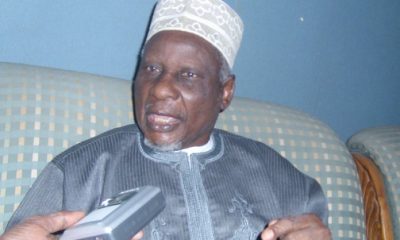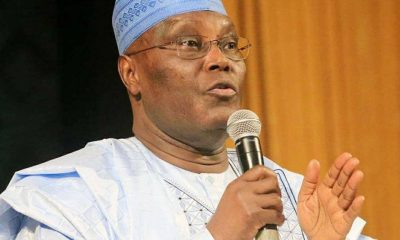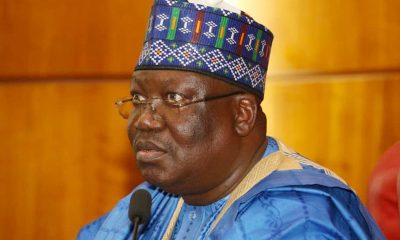Politics
Presidency: APC Line Up 27 Witnesses To Discredit PDP, Atiku’s Petition

Twenty-seven witnesses have been lined up by the All Progressives Congress (APC) to discredit the petition filed by the Peoples Democratic Party (PDP) and its presidential candidate, Atiku Abubakar.
Atiku and PDP had filed a petition against the election of Bola Tinubu in the February 25, 2023, presidential election.
The ruling party charged the Court of Appeal in Abuja to dismiss the petition filed by the PDP.
The proposed witnesses who are all members of the party are expected to testify that the election that produced Tinubu as the President-elect, was conducted in accordance with the provisions of the Electoral Act, 2022 and other extant laws and that there was no such non-compliance substantial enough to affect the result of the election.
APC is contending that the declaration of its presidential candidate as the winner of the election is proper and valid.
It argued that there is no provision in the operative law governing the conduct of elections in Nigeria that makes it mandatory for presiding officers to electronically transmit/transfer results from the polling units directly to the 1st Respondent’s collation system nor is there any such provision making it mandatory for the presiding officer to use the BVAS to upload a scanned copy of the Form EC8A to the 1st Respondent’s Result Viewing Portal (iRev) in real-time.
The Petitioners are hereby put to the strictest proof thereof.
It stated that BVAS is not for electronic transmission but a transfer of documents, which may only be utilized to forward documentation to the INEC’s IReV, but not in real-time as it is not so and further that, the INEC Regulations did not specify real-time electronic transmission as claimed in the Petition or any time lag whatsoever within which the transmission must be done.
The ruling party equally submitted that the important document in the presidential election is the polling unit results-Form EC8A signed by the Presiding Officer and Party Agents, and it is the document used for the collation of results. Each Party is expected to have their own copy of this as soon as elections are concluded at the Polling Units.
“The BVAS machines are essentially for the accreditation of voters. However, the glamorous portrayal of BVAS upload as a validator of results is not supported by the Electoral laws/INEC Regulations. The declared result at the polling units remain extant and petitioners accepted the results as they are not challenging the polling unit’s results.
“The election process as established by INEC’s Regulation is that on completion of all the Polling Unit voting and results procedures, the Presiding Officer shall transfer the result of the Polling Unit, direct to the collation system as prescribed by the Commission, use the BVAS to upload a scanned copy of the EC8A (Form) to the INEC Result Viewing Portal (IReV), as prescribed by the Commission and take the BVAS and the original copy of each of the Forms in a tamper-evident envelope to the Registration Area/Ward Collation Officer, in the company of Security Agents. The Polling Agents may accompany the Presiding Officer to the RA/Ward Collation Centre. There is no mention of real-time transfer of documents in the regulations.”
That further to the above, the election validly took place in the polling units where results were declared after sorting of ballots, counting of votes, and recording of same in the prescribed forms which were signed by the presiding officers and the party agents, were present, including that of the Petitioners and copies issued as prescribed by the Electoral Act, 2022.
In its notice of preliminary objection filed by its lead counsel, Prince Lateef Fagbemi, SAN, marked CA PEPC/A/05/2023, APC
urged the tribunal to dismiss the petition for lacking merit.
APC argued that the tribunal has no jurisdiction to adjudicate on the petitioners’ allegation predicated on ground (D) in paragraph 16 of the petition and the related paragraph 146 which lacks necessary facts or particulars as required by paragraph 4 (1)(d) of the rules of procedure for election petitions ( 1st Schedule to the electoral Act 2022.
That the 1st Respondent (INEC) utilized the technological device (BVAS) deployed for the electronic transmission of the polling units results of the election, as far as practicable, to complement manual transfer of the primary election results in duly completed result forms, and the accreditation data. There was no programmed failure of the election as the Petitioners’ duly earned figures were credited to them in the various States they won. Rather, it was the Petitioners that programmed themselves into failure at the election as they failed to manage their home and fortunes properly thereby enabling a split in the party by which the vice presidential candidate of the Petitioners during the 2019 presidential election decamped in 2022 to pick the Labour Party presidential ticket which development affected the Petitioners’ fortunes in the South-Eastern States of Abia, Enugu, Ebonyi, Anambra, Imo and Lagos States where the Petitioners used to have a good measure of impressive outcomes in the past.
“Respondent shall further contend that all the allegations of the Petitioners concerning the BVAS were mere concoctions and there is no basis for any presiding officer to cancel the elections in all the polling units, which results, were collated pursuant to Section 47(3) of the Electoral Act.”
The 2nd Respondent was duly elected by a majority of the lawful votes cast at the presidential election held on 25th February 2023 and scored the highest number of votes as well as one-quarter of lawful votes at the election in each of at least two–thirds of all the states in the Federation.
It submitted that a candidate who scored the majority of the votes cast at a Presidential Election and secured one-quarter of the votes cast at the election in at least two-thirds of all the States in the Federation need NOT obtained twenty-five per cent of the votes cast in the FCT to be entitled to be declared winner of the election.
APC argues that the inclusion or addition of the Federal Capital Territory (FCT), Abuja by the provision of the Constitution did not attach special or unique conditions or recognition to the Federal Capital Territory but gave Federal Capital Territory parallel recognition with other states of the Federation.
That the averment in paragraph 73(c) of the Petition is Petitioners’ invention and an attempt to import into Section 134(2) of the 1999 Constitution (as amended) what is not contained therein.
That the Petitioners have the burden to prove the allegations, with specific reference to the assertion that the Federal Capital Territory possesses special recognition by the Constitution to the effect that it is mandatory to obtain 25% of the total vote cast in the FCT.












